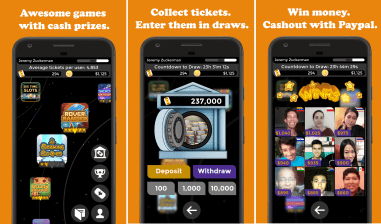How Play to Earn Games Are Creating Opportunities for Gamers to Profit
How Play to Earn Games Are Creating Opportunities for Gamers to Profit
Blog Article
How Play-to-Earn Games Are Transforming the Gaming Industry

Recognizing Play-to-Earn Mechanics
The play-to-earn model has emerged as a cutting edge concept within the video gaming market, essentially modifying the relationship between players and the games they engage with. This design makes it possible for gamers to gain substantial incentives, often in the form of cryptocurrencies or non-fungible tokens (NFTs), through their in-game activities. Unlike conventional video gaming frameworks that commonly generate income from through subscription fees or one-time purchases, play-to-earn games incentivize player participation by directly linking gameplay success to real-world worth.
At the core of play-to-earn technicians is the assimilation of blockchain modern technology, which makes certain openness and verifiable possession of in-game assets. Players can get, offer, or trade these possessions in decentralized marketplaces, equipping them with financial agency previously unseen in traditional pc gaming atmospheres. Each player's payment to the game ecosystem-- be it through skilled play, critical trading, or area participation-- improves the total video gaming experience while giving them a possibility to generate income.
As players invest time and resources, they not only grow their involvement with the game but also promote a dynamic economy that shows their cumulative initiatives (play and earn rewards). This improvement of gameplay right into a monetizable endeavor is improving both gamer inspiration and video game design
Financial Influence On Gamers

In addition, play-to-earn designs equalize accessibility to economic benefits. Gamers from varying socio-economic histories can take part and potentially earn substantial income, bridging voids that exist in standard work markets. This standard change promotes monetary freedom, especially in regions where employment possibility may be limited.
Furthermore, the intro of virtual economies allows gamers to build wealth with critical financial investments in in-game possessions, which can value with time. This has brought about the appearance of a new class of players that come close to play-to-earn as a severe income-generating activity, usually resulting in the reinvestment of earnings right into the pc gaming environment itself. Inevitably, the financial effect on gamers is extensive, as they navigate a landscape where leisure and livelihood assemble.
The Role of Blockchain Innovation
What makes blockchain modern technology a keystone of play-to-earn games is its capacity to offer security, decentralization, and openness. By utilizing a dispersed journal system, blockchain guarantees that all transactions within the video game are taped in an immutable fashion, permitting gamers to validate ownership of in-game properties without depending on a central authority. This transparency cultivates depend on among gamers, as they can separately validate the deficiency and provenance of digital things, boosting their worth.
Furthermore, blockchain innovation empowers players via decentralization, allowing them to take part in peer-to-peer purchases. Players are no longer confined to in-game economic situations controlled by developers; instead, they can trade, market, or lease their assets freely in open markets. This shift not only enhances the general liquidity of digital properties but additionally encourages more meaningful gamer engagement, as customers can directly gain from their time and why not try these out effort purchased the game.
Additionally, blockchain promotes the development of wise contracts, which automate numerous in-game processes, from rewards distribution to governance devices. play and earn rewards. This development decreases the threat of fraud and ensures justice, additional solidifying blockchain's integral function in the evolution of play-to-earn gaming
Challenges and Objections
Often, play-to-earn games deal with significant obstacles and objections that can prevent their growth and approval within the wider gaming community. One main issue is the potential for a speculative bubble, where the worth of in-game assets can rise and fall dramatically, causing economic losses for players. This volatility weakens the security that traditional gaming settings usually offer.
Additionally, the integration of blockchain innovation often increases questions regarding ecological sustainability. The energy usage related to certain blockchain networks has triggered debates pertaining to the ecological effect of these video games. Critics argue that the carbon footprint created by play-to-earn systems could prevent eco-conscious players.
In addition, there are issues regarding access and inclusivity. Many play-to-earn games need gamers to spend substantial upfront capital to acquire needed possessions, developing obstacles for those with limited financial sources. This model can accidentally produce a divide in between wealthier gamers and those who can not afford to take part.
Future Fads in Gaming
As the pc gaming sector continues to develop, several future trends are arising that promise to improve the landscape of play-to-earn games and beyond. One considerable pattern is the enhancing integration of blockchain technology, which boosts openness and safety in deals. This will likely result in greater trust fund amongst players, encouraging bigger fostering of play-to-earn designs.
Additionally, the surge of non-fungible symbols (NFTs) is set to revolutionize electronic ownership, allowing gamers to genuinely have in-game assets. This change will certainly not only empower players however also develop new economic possibilities within the online community. Additionally, the merging of pc gaming with other fields, such as social media sites and decentralized financing (DeFi), is expected to promote innovative gameplay auto mechanics and monetization approaches.
Furthermore, advancements in expert system and artificial intelligence will enable more individualized gaming experiences, Get More Information accommodating specific player choices and enhancing interaction. Ultimately, the growing emphasis on community-driven advancement will likely affect video game design, as players significantly take part in shaping their gaming settings. Jointly, these trends indicate a transformative future for the video gaming market, where play-to-earn designs will certainly play a main duty in redefining gamer interaction and value creation.
Final Thought
Finally, play-to-earn video games stand for a substantial change in the pc gaming industry, fostering economic opportunities through innovative mechanics that leverage blockchain technology. This model not only democratizes access to financial benefits for players from various socio-economic backgrounds but also urges area involvement and empowerment. Regardless of encountering obstacles and objections, the capacity for future improvements suggests that play-to-earn games will certainly remain to form the video gaming landscape, offering new methods for riches development and player involvement.
The emergence of play-to-earn video games represents a significant change in the pc gaming sector, improving the partnership in between players and the digital economic climate (play and earn rewards).The play-to-earn version has actually arised as an innovative concept within the gaming market, basically altering the connection between gamers and the video games they involve with. Unlike standard pc gaming frameworks that commonly monetize via membership fees or single acquisitions, play-to-earn video games incentivize player involvement by straight linking gameplay success to real-world value
These cutting-edge gaming systems empower players to generate real-world earnings through their in-game tasks, thus changing the standard notion of video gaming from a simple leisure activity right into a feasible economic possibility. Regardless of dealing with difficulties and objections, the potential for future developments suggests that play-to-earn video games will certainly proceed to form the pc gaming landscape, offering brand-new avenues for wide Learn More Here range development and gamer involvement.
Report this page